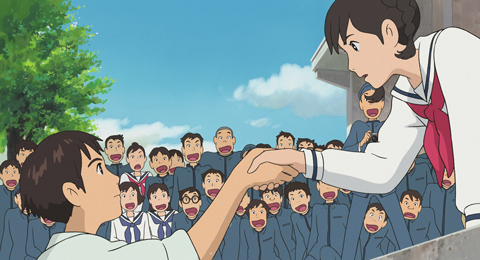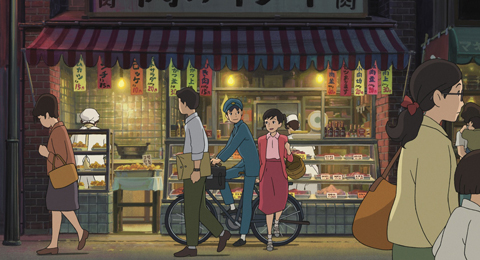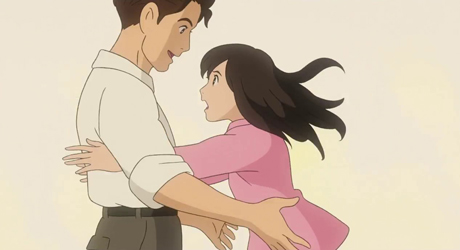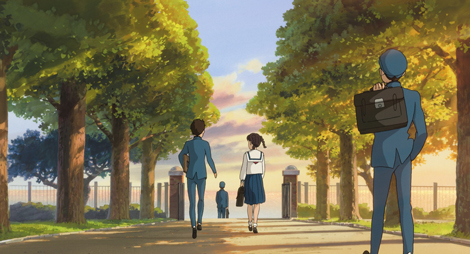Reviewed by Glenn Erickson
The celebrated Ghibil studio's animation classics favor fantasies both flamboyant and modest. Made during the devastating 2011 tsunami disaster, From Up on Poppy Hill is gentle nostalgia about the early 1960s when Japan's economy was finally emerging from the post-war ruin. Instead of magical realms populated by Yokai spooks, the story follows the generally peaceful experience of a high school girl. The rhythm is smooth and quiet, and mundane daily events are given importance. Although Japan produces plenty of animation based on family dramas, this will be a welcome change of pace for many American fans of anime.
The source is a manga (graphic novel) from the early 1980s; its creators co-produced the movie. The director is Goro Miyazaki, the son of Hayao, the founder of Ghibli Studios. Gkids imported the film and re-voiced its soundtrack with Hollywood personalities. I've elected to view and review the original Japanese version thoughtfully retained on Cinedgm's Blu-ray + DVD package.

The movie's very title suggests a reflective, calming attitude. In 1963 Umi Matsuzaki (v: Masami Nagasawa) lives and works in the family boarding house at the top of a hill overlooking Yokohama harbor. She prepares breakfast for all the boarders, which include college students. One of them is Miki Hokuto (Yuriko Ishida), a doctor nearing the end of her studies. Umi's grandmother Hana (Keiko Takeshita) and her younger sister Sora (Haruka Shiraishi) and brother live there as well. Umi's mother Ryoko (Jun Fubuki) has been working in the United States. So far Umi has not confided in any of them with her personal, emotional concerns.
Next door to the high school is a clubhouse in which the rambunctious boys operate various scholastic clubs. Called the Latin Quarter, it's a run-down shambles. Big executive and school trustee Tokumaru (Teruyuki Kagawa), has decided to raze the old building and put in another to serve the coming Olympics. The boys protest this development. Umi suggests that the girls help clean and paint Latin Quarter.
Umi develops a crush on Shun Kazama (Jun'ichi Okada), the president of the school newspaper, and is soon helping him with the stenciled publication. Shun has written a poem about Umi's habit of flying nautical flags from the boarding house. Her father was killed in the Korean War, and she's dealt with her loss by signaling "peace to all voyagers" daily. Their relationship is just warming up when Umi shows Shun a photo of her father. Shun recognizes the photo, as he has a copy of his own. His adoptive father has told him that Umi's father is his as well. Umi is heartbroken to find out that her potential boyfriend may be a blood relative. The kids in "youth" films are usually oriented toward the future. Umi and Shun are focused on preserving the past, but also discovering the truth about it.

The most rambunctious characters in From Up on Poppy Hill are the clubhouse boys, and Tokumaru with his hearty laugh. Umi and her classmates seem to talk in quiet tones at all times, never in outbursts. And when she's with Shun, Umi barely voices her feelings. But we can see the changes in her eyes and her facial expressions -- little clues like changes to the tiny red 'blush' lines on her cheeks. Umi's little sister Sora is more demonstrative, but Umi's peers are trying hard to find their adult selves. War and hardship have marked Umi's family. Mother is a professor of medicine but they must take in boarders to get by. Their house was once a hospital, and we wonder if the war swept away the family's larger medical heritage.
At least half the joy of watching From Up on Poppy Hill is its artwork. The animation poses no challenges and certainly doesn't show off special techniques, but the flow of beautiful images please the eye and calm the nerves. Umi and Shun bicycle downhill to the town, which is shown in rich detail, from streetcars to specialty shops, all with warm lighting sources. Back up at the boarding house, Umi's food prep chores are shown in full detail as well, to the extent of retrieving fresh vegetables from coolers under the floorboards. The food is very simply represented, yet looks appetizing.
As the story is set in 1963, the 'romance' (they hug but do not kiss) is accompanied by Kyu Sakamoto's internationally successful song "Ue o Muite Aruko", known here as "Sukiyaki." Its entrance generates strong emotions. The show breaks from reality only briefly, for a dream in which Umi is reunited with her father. Even this is handled with simple restraint. Yet anyone that misses a departed loved one will relate to it

The affecting From Up on Poppy Hill gets its power from small strokes. When characters are less demonstrative, small gestures take on more importance, and within a few minutes we're searching Umi's face for telling reactions. The lessons taught are simple enough -- Umi and Shun feel a strong desire to honor and respect loved ones that have gone before, which of course spills over into the movement to save the Latin Quarter. By sprucing it up, they increase their sense of participation in the tradition it represents.
Did the story originally have a more pronounced political dimension? The early 60s were an ideological battleground in Japan, with a committed wave of (college) students protesting their government's kowtowing to the United States on military matters, letting big business run wild and jumping on the nuclear bandwagon. Near-riots occurred when eminent domain was used to raze neighborhoods for the '64 Olympics - a time that From Up on Poppy Hill directly addresses.
In this case the Big Business tycoon is a sentimental teddy bear who proves that students and bosses are on the same page in terms of solidarity and harmony. I have no idea if this notion is mainstream or reactionary; my only point of reference are the genre films by dissenting Japanese directors like Nagisa Oshima and Masaki Kobayashi. The movie does have a sequence that depicts without comment colorful clouds of industrial pollution belching from factory smokestacks. An abstract picture by an artist in the boarding house depicts Umi's flags flying in a chaotic blizzard of color.

The movie references the ten year-old Korean conflict, in which Japan gained the lifting of the occupation by fighting alongside its former enemy. Shun's adoptive parents may have a direct relationship to the Nagasaki bombing. I missed any such explanation in my viewing of the movie, but the wiki coverage states that "Shun's mother died in childbirth, and his other relatives were killed in the atomic bombing of Nagasaki." Should we infer that Shun's background is dotted with survivor-victims of radiation poisoning? If so, the shadow of the war hangs more heavily over the story than might be apparent, and makes Umi and Shun's need to "find each other" all the more poignant.
Then again, what good is honoring one's ancestors, if the lessons of their experience are ignored and forgotten? Most of Shun's high school buddies seem ready to follow any patriotic cause laid before them.
Cinedigm and Studio Ghibli's Blu-ray + DVD presentation of From Up on Poppy Hill is a sparkling HD encoding of this sweetly charming picture. Picture and sound are flawless. The audio mix handles the soundscape as if this were a live-action film. It's like an idealized reality. An eclectic mix of music cues include almost everything except traditional Japanese tunes. The music to represent the Latin Quarter sounds European, while the song we know as "Sukiyaki" is an American-style ballad.
The English language dub track is a handsomely produced commercial necessity that erases the film's national-historical identity. C'mon, America, do some work and read a subtitle or two. Kids here grow up thinking that some rule requires foreigners to know how to speak English.
The deluxe Cinedigm presentation comes with a great many extras, such as feature-length storyboards, interviews, videos of press conferences and featurettes about Yokohama and the celebrity American voice cast. An insert booklet includes a note from director Goro Miyazaki and the text of his presentation treatment for the show. It alludes to the fact that in the story as originally conceived, the high schoolers' lost fathers were members of a kamikaze squadron.
On a scale of Excellent, Good, Fair, and Poor,
Blu-ray rates:
Movie: Excellent
Video: Excellent
Sound: Excellent Japanese and English Dub
Supplements: interviews, featurettes, text extras, feature-length storyboards.
Deaf and Hearing Impaired Friendly?
YES; Subtitles: English
Packaging: Keep case in card sleeve
Reviewed: August 18, 2013

DVD Savant Text © Copyright 2013 Glenn Erickson
See more exclusive reviews on the Savant Main Page.
Reviews on the Savant main site have additional credits information and are often updated and annotated with reader input and graphics.
Also, don't forget the
2011 Savant Wish List.
T'was Ever Thus.
Return to Top of Page
|

